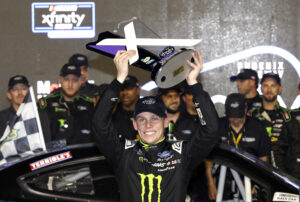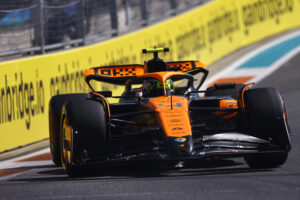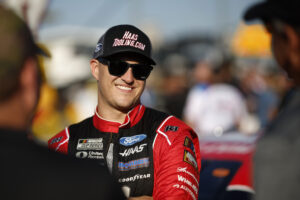F1’s swearing ban: A major talking point into the final leg of the 2024 season
As F1 returned for its yearly American jaunt, a major issue rose to the spotlight, yet again. F1’s controversial swearing ban in 2024, along with Max Verstappen‘s subsequent actions were major talking points last time out in Singapore.
The Dutchman delivered one-word answers at the press conference. He then held his own impromptu session featuring a crowd of journalists outside the official press conference. This was Verstappen’s mode of protesting the ban on swearing in press conferences. As a result, the stewards later penalised the Dutchman with community service for his actions during the press conference.
Several drivers have spoken out in support of the reigning F1 champion in the aftermath of the swearing ban. But, why are many protesting F1’s swearing ban? And why is it unfair in the context of the sport?
A timeline: How F1’s swearing ban triggered a barrage of responses
The outcry around Formula One’s swearing ban emerged during the Singapore Grand Prix weekend. This followed after the FIA banned using swear words during televised coverage, in an attempt to curb the level of language used by drivers during sessions broadcast live.
FIA president Mohammed Ben Sulayem described this as ‘Differentiating our sport – Motorsport, from rap music.’ “Avoid being rappers, you say [the] f-word how many times per minute?” Ben Sulayem controversially expressed his views on the topic.
He further elaborated on requests put into FOM to limit the amount of foul language used on live TV. This meant limiting the use of various swear words during press conferences and live sessions on track. Limiting the usage of swear words was the main goal of Ben Sulayem and the FIA.
Such a ban did not go down well amongst drivers either. The first to react was reigning champion Verstappen. In a calculated attack towards the rule, the Dutchman spoke out strongly against the swearing ban. When asked about the state of his car during qualifying at Baku, the round prior to Singapore, Verstappen used the F-word in his response. “As soon as I went into qualifying, I knew the car was F*****,” he responded.
When asked about the swearing ban, Verstappen responded in his usual critical tone. “Excuse me for the language, but what are we? Five-year-olds? Six-year-olds?” the Dutchman expressed, voicing his displeasure on such a move by the sport’s governing body.
Verstappen takes full toll on F1’s swearing ban and his punishment, gets full support from other drivers
The stewards promptly handed the Red Bull driver community service as a punishment for his words during the press conference, further irking the triple world champion. The situation escalated during Saturday’s post-qualifying press conference, as Verstappen himself unleashed his attack against the punishment dished out to him.
“I’m answering, just not a lot. Problem with my voice,” The Dutchman quoted. He refused to provide more than one-word answers during the post-qualifying press conference. “No, or I might get fined or get an extra day (of community service),” Verstappen responded to host Tom Clarkson, hinting at ‘accidentally’ dropping more swear words if he elaborated on his answers.
“I would prefer if you ask these questions outside the room,” Verstappen responded. The Dutchman promptly hosted a debrief outside the boundaries of the press conference. As expected, a crowd of journalists gathered around to hear his words, sparking further controversy.
What the officials said of Verstappen’s swearing sanctions
During F1’s four-week break between Singapore and Austin, former F1 race-winner Johnny Herbert spoke out on the topic. Herbert was one of the stewards during the Singapore Grand Prix weekend when Verstappen was slapped with community service for swearing during the press conferences.
Herbert delved into the insight behind making such a decision. “At the press conference in Singapore, Max used the ‘F’ word about his car. The press conferences are beamed around the world. There is more swearing than there ever has been. A press conference is not the place for it.” Herbert expressed.
“The incident was referred to us as stewards. We had a good, open chat with Max for about 20 minutes, half an hour, in what was a difficult situation.” Herbert elaborated in an interview with Motorsport.com.
“We could have fined him, but we felt it would be more beneficial to get him to do something socially responsible. It is up to Max and the FIA what that is.” – Herbert concluded.
The former F1 race-winner expressed how there was a “time and space” for swearing too. “I love that [rebellious] side of him, it is what makes Max Max, his honest and outspoken character. But there is a time and a place. Personally, I think there is too much swearing. I don’t want my five-year-old grandchild listening to that sort of language.” Herbert concluded, referring to the situation.
How others reacted to F1’s swearing ban controversy
Verstappen’s fellow competitors backed his actions. Lewis Hamilton and Lando Norris too spoke out against the ban. “It [the swearing ban] is a bit of a joke,” the seven-time champion expressed, disapproving of the ban on swearing. “I certainly wouldn’t be doing it” the Briton motioned to Verstappen to skip the community service punishment dished out by the FIA.
Norris too expressed his resentment against F1’s swearing ban and backed Hamilton’s words on Verstappen skipping community service. “I think it’s pretty unfair, I don’t agree with any of it,” Norris expressed during the post-qualifying press conference.
George Russell too termed the swearing ban ‘silly’ as he hoped for talks between the Grand Prix Drivers Association (GPDA) and the FIA ahead of Mexico.
“Yeah, definitely between the drivers, a lot have spoken regarding swearing. It does seem a little bit silly that it has come to this,” Russell explained. “I mean, we’ve yet to speak with the FIA, but we hope to do so probably next week, maybe in Mexico. But collectively, we’re all on the same page.
“I think next week, we’ll probably formally put something towards you guys [the media] to read from the drivers as a united whole,” Russell, the president of the GPDA, expressed on F1’s swearing ban.
It wasn’t just Formula One drivers voicing their concerns against the ban. Rally racers Thierry Neuville, Ott Tänak and Sebastian Ogier also spoke out against the ban after WRC’s Rally Chile. “You realise that I didn’t really want to talk, we’ve been told that we shouldn’t at the moment,” Sebastian Ogier expressed. He had been fined €30,000 for his comments towards officials during the event.
“We have been told by the top of the FIA to shut our mouths, so it is a bit sad,” Ogier voiced his disappointment on the situation.
The dilemmas and difficulties F1 will face in curbing swearing on live broadcasts
It’s common for any sportsperson to utter the unmistakable expletive in the heat of the moment. High on adrenaline, it’s difficult for anyone to stop themselves from expressing their emotions during high-pressure sporting events.
Swearing, as such, isn’t a problem exclusive to motorsport. Four-time champion Sebastian Vettel stood up for Hamilton during the press conference at Bahrain, back in 2018. A journalist had posed the question to the Briton for his comments, watching back Verstappen’s in the cool-down room.
“I don’t know what Lewis did. We’ve all been in that situation, we fight someone, we go sometimes wheel-to-wheel, it’s close and you have a lot of adrenaline going.”
The German then drew comparisons to footballers too. “Do you think, comparing to football, if you have a microphone on a football player’s mouth, that everything he says is something nice and is a nice message when the guy tackles him and maybe sometimes he fouls him or not?” he expressed.
There is also the issue of how FIA President Ben Sulayem addressed the situation. The ‘rappers’ comment was a stereotypical comment with some racial undertones, something Lewis Hamilton pointed out.
#F1 | FIA President, Ben Sulayem, recently made a few comments regarding drivers swearing on radios:
“We’re not rappers. There is a difference between our sport, motorsport, and rap music.”
‼️ Lewis Hamilton comments on the remarks: “I don’t like how he’s expressed it, saying… pic.twitter.com/qzjgX9xWkM
— deni (@fiagirly) September 19, 2024
Herbert too voiced out how he wouldn’t want his grandson uttering swear words after watching F1 races. This brings in the case of fans being more self-aware. In some cases, it could go down to educating their younger ones to avoid using swear words.
While swear words are often bleeped out on official broadcasts, edited videos often slip out onto social media sans the bleeps. They are also witnessed in Netflix’s famous Drive to Survive series. With younger generations exposed to social media nowadays, content creators and social media platforms need to be much more alert of the content being shared on their platforms, to ensure younger ones do not absorb the wrong content.
Considering the various dilemmas, you simply cannot think to wonder how difficult it is for F1 to implement the swearing ban in full force.






